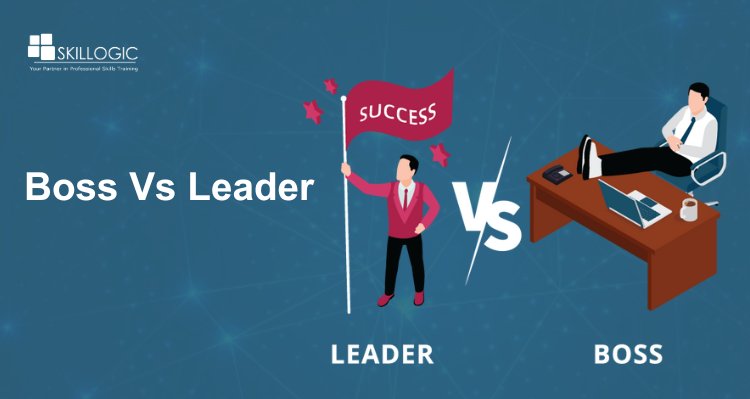Boss vs. Leader - A Comprehensive Guide to Effective Leadership in the Workplace

Despite the fact that the phrases boss and leader are sometimes used synonymously, they each have distinct meanings. The Boss is a powerful individual who places more emphasis on business results than on interpersonal interactions. Leaders, on the other hand, evaluate situations carefully and alter communications, corporate procedures, and relationships for the better
This article will explain the distinction between a boss and a leader, allowing you to decide which is preferable. Let's evaluate the differences between a boss and a leader.
Who Is a Boss?
A boss is someone who has power over other people in an organization. Often, they are in charge of establishing objectives and motivating staff to meet them. Bosses can have a variety of functions and traits depending on their structure and management style. While some managers actively participate in every aspect of their team's work and are hands-on, others delegate more and offer assistance as needed. Some are more laid-back and personable, while some employers are autocratic and expect respect. The best employers are those who can successfully inspire and motivate their staff to perform at the highest level.
Refer to these articles:
- Who Is a Project Management Officer?
- Complete Guide to PRINCE2 Certification
- Complete Guide to PMP Certification
Who Is a Leader?
A leader is someone who inspires and motivates people to work towards a common objective. Depending on their organization and the circumstances, leaders can adopt a variety of positions and philosophies. While some team leaders actively participate in every element of their team's work, others delegate more and offer direction as necessary. Some are more laid-back and friendly, while some leaders are autocratic and demand respect. The most effective leaders are those who can effectively inspire and motivate their team members to produce their finest work. PMP training can further enhance a leader's ability to manage projects efficiently and lead teams to success.
What is PMP® Certification?
Difference Between a Leader And a Boss
- A boss imposes orders a leader collaborates: Leaders like collaborating with others to achieve the most fruitful outcomes possible as a team. They don't only leave progress under the control of one or two managers. Although a capable manager is a valuable tool, leaders are hands-on and collaborate with team members and partners to come up with creative ideas.
- Leaders prioritize people whereas bosses prioritize results: A boss concentrates on the immediate here and now, putting out the daily fires. A leader never wavers from doing the right thing. Bosses prioritize processes and outcomes over employees. Even when employees raise novel ideas or issues, they could continue to follow a predetermined system playbook. This kind of disregard for people's preferences in favor of organizational tradition never serves an organization well. A boss concentrates on counting value and may even reduce value, whereas a leader focuses on producing value through leadership.
- Leaders have followers and bosses have employees: Leaders are respected for their personalities, behaviors, and convictions. A leader shows a great degree of love for their profession and personally invests in tasks and projects. While these goals may not always be those of the company, leaders are very concerned with the happiness of their followers and want to help them achieve their goals. Employees who work for bosses often do so out of duty or a desire to win the boss' favor rather than because they are inspired or influenced by the boss.
- A boss turns employees into examples rather than a leader setting an example for them: Leaders ensure that the laws also apply to them. They adopt them, implement them, and adjust them as necessary. They set an example for the behavior they want to see at work. This frequently entails having an optimistic outlook, appearing frequently, and arriving early.
- Leaders develop people while Bosses use them: Genuine leaders, recognizing the capacity for improvement in their team members, aim to nurture future leaders, enhancing their own reputation. A strong leader actively supports the success of their followers. In the context of project management, obtaining a Prince2 Certification can further empower leaders to guide their teams effectively. Leaders prioritize frequent meetings with their staff, offering constructive criticism to facilitate improvement. They take the time to understand team members and provide assistance whenever possible. Unlike managers who may lack time for complaints, leaders invest in building relationships and fostering growth.
- Bosses demand excellence leaders instill it: Good leaders make excellent teachers. Even if they are unfamiliar with the task at hand, managers expect their staff to know the best approach to complete it. The leader instructs their team members in the most effective way. It takes time to train your staff, and a significant part of what makes a great teacher is their desire to listen. It will be simpler to get results in a more time-efficient manner if you take the time to comprehend and teach your staff.
When Does a Team Need a Boss?
An effective team requires a boss. The team's leader gives them direction and instruction, keeps them focused and on task, and holds them responsible for their activities. A manager also delegated duties, gave feedback, and made decisions on behalf of the team. A boss also mediates disputes among the team members and mentors and develops them as team members. Finally, the team is championed by the boss, who also represents the team to other stakeholders.
Read these articles:
- What is the PMP Certification Cost in Bangalore
- How much is the PMP Certification Cost in Chennai?
- What will be the PMP Certification Training Cost in Pune
When Does a Team Need a Leader?
For a team to succeed, a leader is necessary. A leader directs the group and establishes the team's goals. A leader also equips team members with the tools they need to succeed by inspiring and motivating them. A leader also fosters team unity and trust while resolving disputes within the group. A leader is also in charge of informing other stakeholders about the team's advancements and successes.
Final Note
By contrasting the roles of a leader and a boss, this article explains the differences between the two. Bosses enforce accountability while leaders establish it, which is the main distinction between the two. While leaders utilize strategies like mentoring and assistance to help others fulfill their potential, bosses frequently use fear or threats of punishment to influence others. Decide which is ultimately best by contrasting the qualities of a boss and a leader. You might look into the Project Management Online Courses offered by SKILLOGIC Institute to gain a solid understanding of a range of abilities and subjects pertinent to your industry. You can simply upskill yourself to advance your profession by enrolling in and finishing these courses at your own time and speed.
3 Reasons for Why PMP?
PRINCE2 Certification - What is it
PRINCE2® Vs PMP®
PMP® Training Risk Management

 admin
admin 



